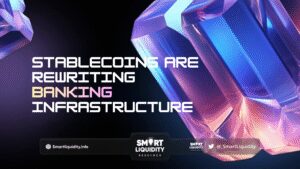The Intersections of Real World Assets (RWA), DeFi and Crypto


DeFi and crypto are bringing real-world assets like real estate, art, or invoices onto the blockchain, creating a new financial landscape with broader access and efficiency. This article dives into how this exciting convergence is transforming both traditional and decentralized finance.
How DeFi and Crypto are Bringing Real-World Assets On-Chain
Traditionally, RWAs have been illiquid and inaccessible to a broad investor base. DeFi and crypto are changing this dynamic through a process called tokenization. Tokenization involves creating digital tokens on a blockchain that represent ownership of a real-world asset. These tokens can then be easily traded, fractionally owned, and integrated into DeFi protocols.
Here’s how it works:
- Asset Selection and Valuation: The first step involves selecting the RWA to be tokenized and determining its fair market value.
- Smart Contract Development: A smart contract, a self-executing code on the blockchain, is created to govern the ownership and transfer of the tokenized asset.
- Tokenization and Distribution: The RWA is then converted into digital tokens on the blockchain. These tokens can be distributed through various channels, such as private placements or public offerings.
DeFi protocols leverage these tokenized RWAs to create innovative financial products and services. For instance, tokenized real estate can be used as collateral for borrowing or lending cryptocurrencies. Similarly, tokenized invoices can be used to access working capital for businesses.
The Benefits of RWA Tokenization for Traditional Finance
RWA tokenization offers significant potential for the traditional finance (TradFi) sector. It can improve efficiency by automating tedious processes like KYC (Know Your Customer) and AML (Anti-Money Laundering) checks through smart contracts. Additionally, tokenization can unlock new funding avenues for businesses. Companies can leverage DeFi protocols to raise capital by issuing tokenized securities like bonds or fractional ownership of their assets. This can be a faster and more cost-effective alternative to traditional methods of raising capital.
The integration of RWAs into DeFi offers several advantages for traditional finance institutions:
- New Revenue Streams: Traditional financial institutions can leverage DeFi protocols to offer innovative products and services to their clients, such as tokenized investment funds or lending options backed by real-world assets.
- Improved Efficiency: Tokenization can streamline back-office operations for traditional financial institutions by automating processes and reducing reliance on manual paperwork.
- Enhanced Risk Management: Blockchain technology can improve risk management for traditional institutions by providing transparent and immutable records of ownership and transactions.
- Reduced Costs: Smart contracts and automation eliminate the need for intermediaries, potentially reducing administrative and operational costs for financial institutions.
- Increased Innovation: The integration of DeFi and RWAs opens doors for innovative financial products and services. For example, tokenized mortgages could provide faster loan approvals and more efficient loan management.
Overall, the convergence of DeFi and RWAs presents a unique opportunity for traditional finance to modernize its infrastructure and tap into new markets and revenue streams.
Fractional Ownership of RWAs through DeFi
One of the most exciting aspects of RWA tokenization is the possibility of fractional ownership. Traditionally, owning an expensive asset like a piece of real estate required a significant upfront investment. DeFi protocols allow these assets to be divided into smaller, tradable tokens. This makes it possible for a wider range of investors to participate in the ownership of high-value assets, democratizing access to these investment opportunities.
Fractional ownership also offers advantages for asset owners. By tokenizing an asset, they can unlock its value without having to sell the entire asset outright. This can be particularly beneficial for illiquid assets such as real estate, allowing owners to access capital without needing to sell the entire property.
Fractional ownership of RWAs, facilitated by tokenization, is a game-changer for investors. Here’s how it works:
- Tokenization Platforms: Platforms specialize in tokenizing various RWAs. These platforms handle the legal and technical aspects of tokenization, ensuring compliance and security.
- Investment Opportunities: Investors can browse these platforms and choose from a diverse range of tokenized assets. They can then purchase fractions of these tokens, depending on their budget and risk appetite.
- Trading and Management: DeFi protocols allow for the easy trading and management of tokenized RWA holdings. Investors can track their investments, monitor performance, and trade their tokens on decentralized exchanges.
How RWAs Can Address Sustainability Concerns
DeFi and crypto can play a crucial role in promoting sustainability through RWAs. Here are some possibilities:
- Green Bonds and Sustainable Investments: DeFi can facilitate the issuance and trading of green bonds, which are financial instruments that raise capital for environmentally friendly projects. Tokenization can ensure greater transparency in the allocation of funds and allow for more efficient tracking of the impact of these projects.
- Carbon Credits and Offsets: Tokenizing carbon credits can create a more liquid market for carbon offsets, a crucial tool for mitigating climate change. This can incentivize businesses and individuals to invest in sustainable practices and contribute to a more carbon-neutral future.
- Impact Investing: DeFi can empower investors to make informed decisions based on an asset’s environmental and social impact. By integrating sustainability data with DeFi platforms, investors can choose to support projects that align with their values while still achieving financial goals.
Building a Future for RWAs in the DeFi and Crypto Ecosystem
The integration of RWAs into DeFi is still in its early stages, but it holds immense potential to transform the financial landscape. As the technology matures and regulatory frameworks evolve, we can expect to see increased adoption of RWA tokenization.
Here are some key areas for future development:
- Regulatory Framework: Clear and consistent regulations are essential for fostering innovation and protecting investors. Governments and regulators need to develop frameworks that address the unique challenges and opportunities presented by RWA tokenization.
- Standardization: Standardization of tokenization processes and protocols will be crucial for facilitating interoperability between different DeFi platforms and ensuring the smooth functioning of the RWA tokenization ecosystem.
- Security Enhancements: As the value of tokenized RWAs grows, robust security measures will be essential to protect against cyberattacks and fraud. Continued development of secure smart contract programming languages and auditing practices will be crucial.
Conclusion
The intersection of RWAs, DeFi, and crypto presents a groundbreaking opportunity to reshape the financial landscape. By leveraging the power of blockchain technology, tokenization unlocks new possibilities for both traditional and decentralized finance. From increased liquidity and accessibility to enhanced transparency and efficiency, RWA tokenization offers a win-win situation for investors, businesses, and financial institutions. While challenges remain in terms of regulation, standardization, and security, continued innovation and collaboration hold immense promise for building a future where RWAs seamlessly integrate with the DeFi and crypto ecosystem, fostering a more inclusive and efficient financial system.




